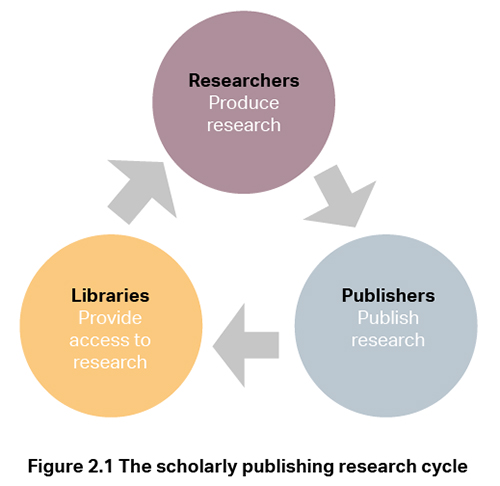2. Introduction
2.1 The scholarly publishing research cycle
This report is about the scholarly publishing research cycle: the virtuous circle by which researchers disseminate their research findings and build upon the findings of others. More concretely this is the process of researchers producing research outcomes, these outcomes are published by publishers, libraries provide access to the research, and then researchers read the research and use that research to build their own future research.
Such a model is obviously overly simplistic. The reality is an increasingly complex ecosystem with a wide range of actors that don’t fit neatly into the categories of ‘Researcher’, ‘Publisher’ or ‘Library’: research funders; research institutions; search engines; social network sites; publishing platforms; and the wider public. The web also provides a means by which publishers can provide access to research without the need of libraries, and libraries can publish research without the help of publishers.
Nonetheless, the simplified model provides a useful framework in a time of changing roles, new players, and increasing complexity. As George Box famously stated, ‘all models are wrong, but some are useful’.

2.2 The structure of this report
This report is based on the findings of an online survey and a series of interviews with researchers, publishers and information professionals, and the simplified model of the traditional scholarly publishing research cycle is used to provide a structure for the report.
Following an overview of the methodology, and a discussion of the overall findings of the survey, the main body of the report is structured according to the traditional roles played by each of the three sectors, and the issues that were identified as being the most significant.
The changing information ecosystem not only means that traditional roles are not tied to any single type of institution, but the issues raised can also have an impact on multiple roles. For example, whereas subscription costs were once associated solely with providing access to research, now it is equally important with the publishing of research. For the sake of brevity, the issues are addressed in the most pertinent place.
Producing research
- Researcher funding
- Publish or perish
- Measuring impact
Publishing research
- Changing publishing model
- Open access and licensing
- Data and non-traditional scholarly output support
- Trust and validation
Providing access to research
- Institutional relevance
- Accessibility
- Piracy
- Discoverability
Each of the issues is discussed in terms of its perceived importance, how the respondents perceive the issues, and some of the respondents’ suggestions as to how the issue could be addressed.
A mixed methods approach was taken to identifying some of the challenges affecting the scholarly publishing cycle, combining an online survey with a smaller number of in-depth interviews with people working in the research, publishing, and library sectors.






